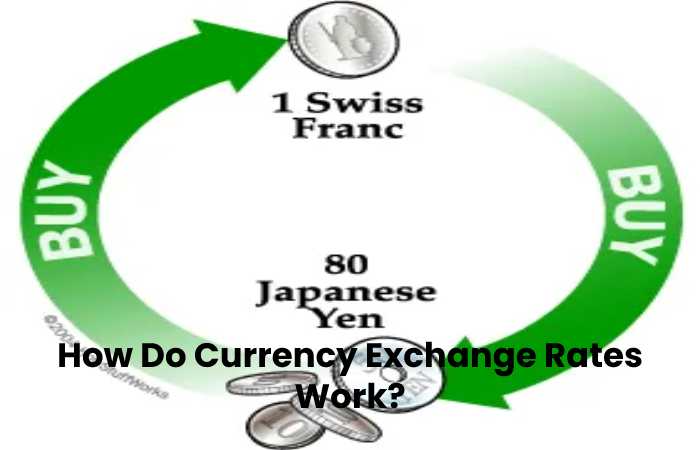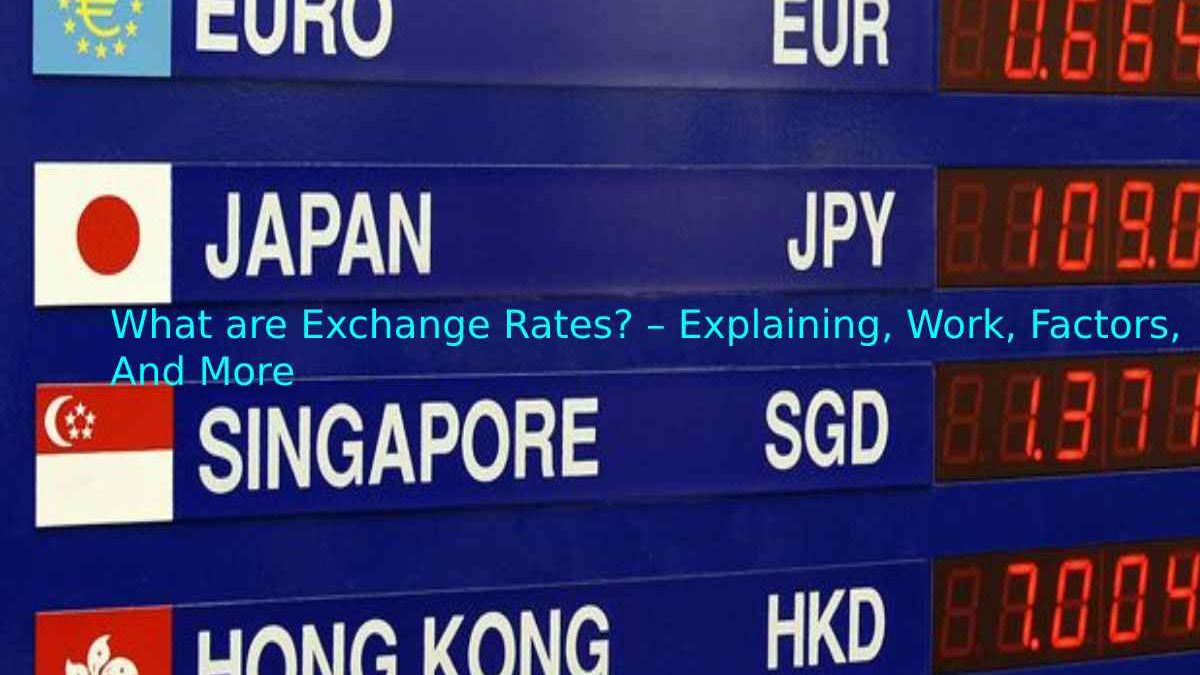Exchange Rates: The exchange rate is the value of a country’s money for another country’s capital. An exchange rate is “fixed” when countries use gold or extra agreed-upon regular, and each currency is worth a specific measure of the metal or other benchmark. An exchange rate is “floating” when supply and request or gossip sets exchange rates. If a country imports many goods, the order will push up the exchange rate for that country, making the imported goods more expensive to buyers in that country. As the goods develop more expensive, demand drops, and that country’s money becomes cheaper than other countries’ money. Then the country’s interests become more affordable to buyers abroad, request rises, and exports from the country increase.
World trade now depends on a managed moving exchange system. Rules act to stabilize their countries’ exchange rates by limiting imports, stimulating exports, or devaluing currencies.
Table of Contents
How Do Currency Exchange Rates Work?

An exchange rate expresses how much your currency is worth in a foreign currency. Think of it as the price charge to obtain that currency. For the sample, in January of 2022, one euro stood at $1.13 U.S. dollars, and one U.S. dollar was equivalent to 0.88 euros.
Kinds of Exchange Rates
There are two kinds of exchange rates: supple and fixed. Flexible exchange charges constantly change, while fixed exchange rates rarely change.
Flexible
Most currency exchange rates by the foreign exchange market, or forex. Such rates are called flexible exchange rates. For this reason, exchange rates swing on a moment-by-moment basis. Prices constantly change for the currencies that Americans are most likely to use.
These include Mexican pesos, Canadian River dollars, European euros, British pounds, and Japanese yen. These countries use flexible exchange rates.3 The government and central bank don’t actively intervene to keep the exchange rate fixed. Their policies can affect rates over the long term, but the government can only control, not regulate, exchange rates for most countries.
Fixed
Other currencies, like the Saudi Arabian riyal, hardly change. Those countries use fixed exchange charges that only vary when the government says so. These rates to the U.S. buck. Their central banks have plenty of money in their foreign currency reserves to control how much their currency is worth.
To keep the exchange rate immovable, the central bank grips U.S. dollars. If the value of the resident currency falls, the bank wholesales its dollars for local currency. That reduces the source in the marketplace, improving its currency’s value. It also increases the supply of dollars and transports its value down. If a request for its money rises, it does the reverse.
The Chinese yuan used to be a secure currency. Now, the Chinese government is gradually transitioning to a flexible exchange rate. Income changes less often than an adjustable exchange rate but more regularly than a fixed exchange amount.
As of Jan 21, 2022, one U.S. buck value is 6.36 Chinese yuan.4 Since February 2003, the U.S. dollar has weakened against the yuan. One U.S. dollar was exchanging for 8.28 yuan at that time. The U.S. greenback has weakened because it can buy less yuan today than in 2003.
Three Factors Affecting
Interest rates, money supply, and financial stability affect currency exchange rates. Because of these factors, the request for a country’s currency depends on what is fashionable. First, the interest rate paid by a country’s central bank is a significant issue. The higher the interest rate type, the currency more respected. Investors will exchange their cash for higher-paying ones.
They then save it in that nation’s bank to receive the higher interest rate. Second is the money supply that the country’s central bank creates. If the government prints too much currency, then too much of it is chasing too few belongings. Currency pouches will bid up the prices of things and services. That makes rise. If there is way too much money, it causes hyperinflation.
Some cash pouches will invest overseas where there isn’t inflation, but they’ll find that there isn’t as much request for their currency since there’s so much. That’s why inflation can impulsion the value of money down. Third, a country’s economy growing and financial stability affect its currency exchange rates.
If the government has a strong, growing economy, depositors will buy its goods and facilities. They’ll necessity more of their currency to do so. If the economic stability looks terrible, they will be less willing to invest in that nation. They want to be sure they will get paid spinal if they hold government bonds in that currency.
How Exchange Rates Touch You
If you’re travelling overseas to another country that uses a different currency, you must plan for conversation amount values. When the U.S. dollar is strong, you can buy extra foreign currency and like a more reasonable trip. If the U.S. dollar is weak, your trip will cost extra because you can’t buy as plentiful external currency. Since the exchange rate varies, you strength find that the cost of your journey has different since you happening developing it. This is just one of the ways discussion rates touch your finances.
Google has a tool to help with this. You can search online to find the exchange rate of the U.S. dollar to foreign currency for any given day. It even shows a chart representing whether the dollar is strengthening or weakening. If it’s supportive, you can wait until before your trip to buy your currency.
Conclusion
Flexible exchange rates can take variation day to day but are frequently in less than one cent increments. But significant economic factors, like government shifts or business decisions, can impact international exchange rates. For instance, consider the changes in the U.S. Dollar between 2002 and 2015.
When the United States national debt raised significantly between 2002 and 2007, the American Dollar dropped compared to its international counterparts. When the economy entered the “Great Decline,” the dollar gained some strength because major corporations held onto their wealth.

